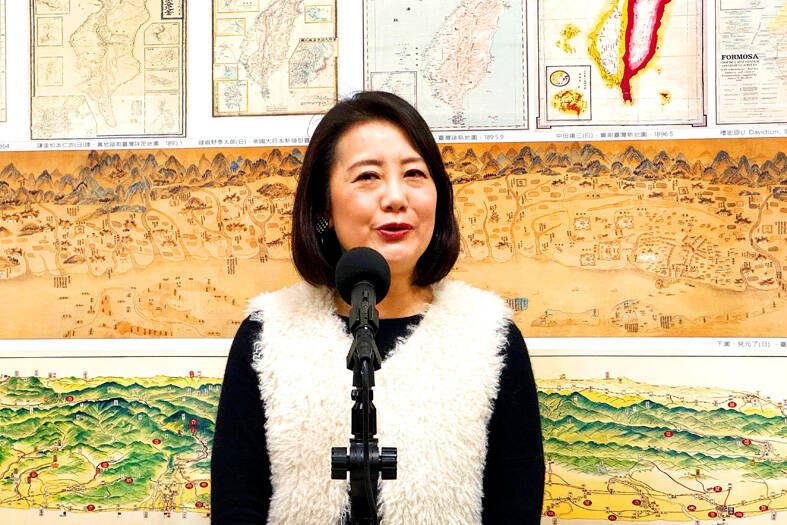A proposal to make presidential elections a “two-round system” was widely criticized yesterday, with lawmakers saying that it was unconstitutional, would subvert Taiwan’s political system and is a delusional idea that would waste resources.
Chinese Nationalist Party (KMT) Legislator Weng Hsiao-ling (翁曉玲) earlier this week proposed amendments to the Presidential and Vice Presidential Election and Recall Act (總統副總統選舉罷免法) that would require candidates to win a majority of votes and if no one garners more than 50 percent, a second-round election between the two top tickets should be held.
Article 63 of the act would be changed from the group of candidates who “get the most votes shall be elected” to “get a majority of votes shall be elected,” said Weng, who is a professor of law.

Photo: Chen Cheng-yu, Taipei Times
Taiwan should learn from France and Austria, which have two-round systems, she said.
However, lawmakers — including some from Weng’s own party — criticized the idea.
KMT Legislator Lai Shyh-bao (賴士葆) said that the proposal calls for a second-round vote — if required — two weeks after the first round, which “would require a lot of resources and come at a high cost to society.”
Democratic Progressive Party (DPP) Legislator Rosalia Wu (吳思瑤) said that the proposed changes would contravene the Constitution.
Weng’s proposal is a delusional and absurd idea, and exposes her ignorance of the law, Wu said.
Weng should read Article 2 of the Additional Articles of the Constitution (憲法增修條文), which states that “the presidential and the vice presidential candidates” must register jointly on the ballot, with “the pair that receives the highest number of votes” being elected, Wu said.
“To change the electoral system would require considerable discussion in society, as well as an extensive study on how it would affect expenses and resources,” she said.
It appears that KMT members believe a two-round system would benefit their party, she added.
DPP Legislator Michelle Lin (林楚茵) also said that the proposal ignores the Constitution.
“No matter what her aims are, Weng should not undermine the Constitution and subvert our political system,” Lin said.
Lin said that Weng has a political agenda, as her husband is Chen Chun-sheng (陳春生), a judge appointed by former president Ma Ying-jeou (馬英九) of the KMT.
“Weng is supposedly an expert in constitutional law, but it appears that she is trying to circumvent the Constitution, as she knows that the KMT would not be able to reach the threshold to amend it according to the rules — even with the support of the Taiwan People’s Party,” Lin said. “Maybe she is just seeking the media spotlight and attention on social media.”
In January’s presidential election, there were 19.54 million eligible voters, with 14.04 million casting ballots, Weng wrote in her motion seeking the amendment.
“For a ticket to win in the first round, it must obtain more than half of the ballots cast, or about 7.02 million votes,” she wrote.
“The DPP’s presidential ticket of Vice President William Lai (賴清德) and former representative to the US Hsiao Bi-khim (蕭美琴) garnered 5.58 million votes, or 40.05 percent,” she wrote.
The DPP’s ticket did not win a majority and it did not win a majority in the legislature, creating a “rule by minority,” she added.
Additional reporting by Chen Cheng-yu and CNA

CAUTION: Based on intelligence from the nation’s security agencies, MOFA has cautioned Taiwanese travelers about heightened safety risks in China-friendly countries The Ministry of Foreign Affairs (MOFA) yesterday urged Taiwanese to be aware of their safety when traveling abroad, especially in countries that are friendly to China. China in June last year issued 22 guidelines that allow its courts to try in absentia and sentence to death so-called “diehard” Taiwanese independence activists, even though Chinese courts have no jurisdiction in Taiwan. Late last month, a senior Chinese official gave closed-door instructions to state security units to implement the guidelines in countries friendly to China, a government memo and a senior Taiwan security official said, based on information gathered by Taiwan’s intelligence agency. The

The National Immigration Agency (NIA) said yesterday that it will revoke the dependent-based residence permit of a Chinese social media influencer who reportedly “openly advocated for [China’s] unification through military force” with Taiwan. The Chinese national, identified by her surname Liu (劉), will have her residence permit revoked in accordance with Article 14 of the “Measures for the permission of family- based residence, long-term residence and settlement of people from the Mainland Area in the Taiwan Area,” the NIA said in a news release. The agency explained it received reports that Liu made “unifying Taiwan through military force” statements on her online

Taiwan Semiconductor Manufacturing Co (TSMC), the world’s largest contract chipmaker, said yesterday that it is looking to hire 8,000 people this year, at a time when the tech giant is expanding production capacity to maintain its lead over competitors. To attract talent, TSMC would launch a large-scale recruitment campaign on campuses across Taiwan, where a newly recruited engineer with a master’s degree could expect to receive an average salary of NT$2.2 million (US$60,912), which is much higher than the 2023 national average of NT$709,000 for those in the same category, according to government statistics. TSMC, which accounted for more than 60 percent

Tung Tzu-hsien (童子賢), a Taiwanese businessman and deputy convener of the nation’s National Climate Change Committee, said yesterday that “electrical power is national power” and nuclear energy is “very important to Taiwan.” Tung made the remarks, suggesting that his views do not align with the country’s current official policy of phasing out nuclear energy, at a forum organized by the Taiwan People’s Party titled “Challenges and Prospects of Taiwan’s AI Industry and Energy Policy.” “Taiwan is currently pursuing industries with high added- value and is developing vigorously, and this all requires electricity,” said the chairman